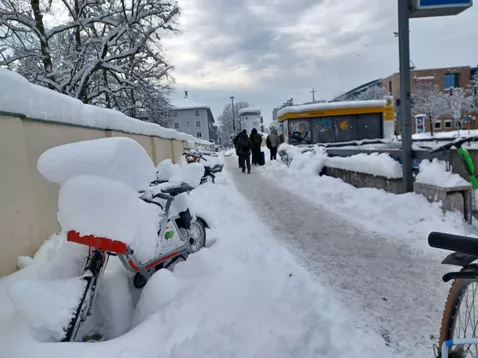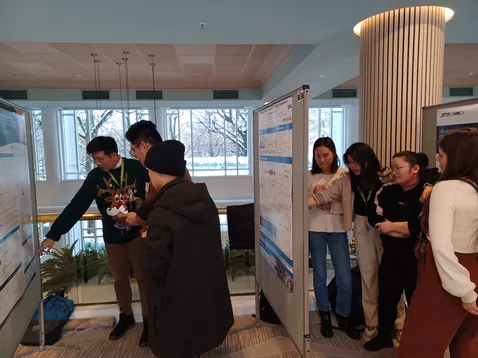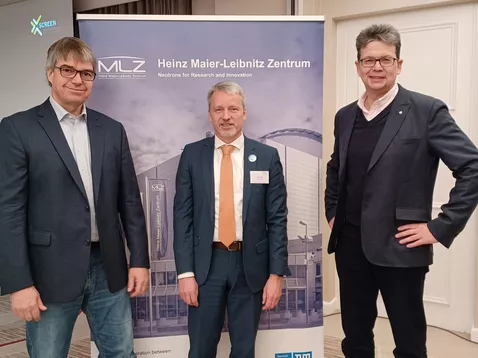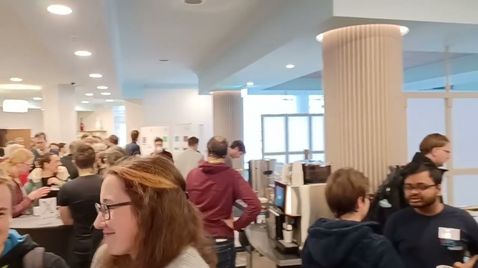User meeting despite ice and snow
User Office, Allgemein |



“This was an MLZ User Meeting that many will remember for a long time to come,” says organizer Dr. Ina Lommatzsch from the MLZ User Office. Not only because of the excellent presentations and posters and the informal atmosphere but also because of the unique weather conditions. When the weather chaos with half a meter of snow loomed on the weekend, Ina Lommatzsch had organized video cameras in some parallel sessions and streamed the plenary lectures at the venue. This allowed the presentations to be held remotely and the plenary lectures broadcast via video conference.
Record number of posters and presentations
In total, there were 63 presentations and 116 posters, a new record number of contributions in the history of the MLZ User Meetings. Only a few presentations took place via video conference.
The two invited talks were particular highlights. Prof. Dr. Michael Gradzielski from TU Berlin gave his presentation on polyelectrolytes online after his flight was canceled due to freezing rain. Prof. Dr. Piero Baglioni had made it from Florence and reported on the cleaning of works of art, such as church frescoes or Picasso paintings. He had investigated the environmentally friendly organogels, which was developed by his team using small-angle neutron scattering at the MLZ.
The Chairman of the Committee Research with Neutrons, Prof. Dr. Frank Schreiber from the University of Tübingen, used his presentation to introduce the representation of the approximately 1400 neutron researchers in Germany.
20 projects for instrument upgrades
The participants eagerly awaited the presentations by the two scientific directors of the MLZ, Prof. Dr. Peter Müller-Buschbaum and Prof. Dr. Martin Müller. Martin Müller reported on the status of the instrument upgrade project MORIS (MLZ organized refurbishment of the instrument suite): It will be externally assessed in November 2024. A total of 20 projects are planned.
Three instruments are to be renewed entirely, seven upgraded, eight further projects concern upgrades of techniques, and two the sample environment with new magnets. Martin Müller pointed out that the MLZ is one of Europe’s five major neutron sources, alongside the ILL in France, ISIS in England, SINQ in Switzerland, and the ESS in Sweden, which is still under construction. “We want to keep our scientific instruments competitive and attractive,” said Müller, explaining the motivation behind the MORIS project.
Restarting without a cold source
In his presentation, Peter Müller-Buschbaum reported on the status of the central channel of the FRM II and the cold source. A great deal depends on external companies, and the schedule envisages the research reactor being restarted in the summer of 2024. However, this will initially be without a new cold source, which cannot be delivered until 2025 the earliest.
Backlog is set to zero
Another critical piece of news for users was that the backlog, i.e., all outstanding beamtime proposals, will be completely reset to zero. “Anyone who still has a need must resubmit their proposal without making any changes. This will then be reviewed with priority,” said Peter Müller-Buschbaum.
At the end of his presentation, the Scientific Director, who had been at the helm of the FRM II and MLZ since 2018, bid farewell and handed over to his successor, Prof. Dr. Christian Pfleiderer from the Technical University of Munich.
“Lifting golden nuggets onto the hard drives”
Finally, there were words of praise for the successful event, a big thank you to Peter Müller-Buschbaum, and encouraging words for the crisis-ridden MLZ workforce from MLZ User Committee Chairman Prof. Dr. Tommy Nylander (Lund University): “There is light at the end of the tunnel.” He called on everyone to lift the “golden nuggets” on their hard drives and to evaluate and publish previously unpublished MLZ measurement data.
